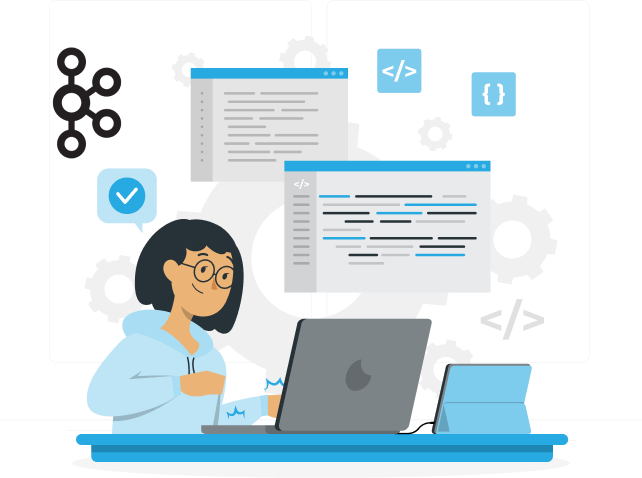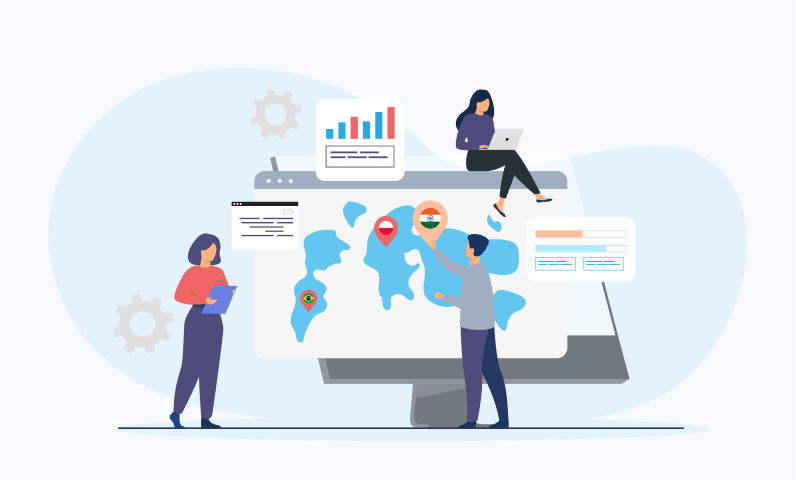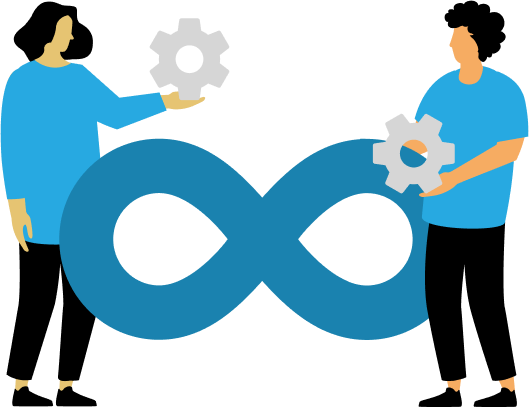Python has become one of the most widely adopted programming languages across the world, and its combination with cloud computing is changing the paradigm for developers and organizations. The elasticity, scalability, and efficiency offered by this amalgamation of Python with cloud technology enable organizations to go really streamlined in their operations and innovate in ways never possible before. We will be discussing this entire blog based on how Python is being put into the cloud, its advantages, popular platforms, use cases, and how businesses can capitalize on this powerful combination to their advantage.
The Emergence of Python in Cloud Computing
Why Python?
Thanks to the simplicity of the language and its high readability, the popularity of Python grew rapidly. As a multiparadigm language, it supports and can be used for procedural, object-oriented, and functional programming. Thanks to such versatility, nowadays, Python is an ideal tool for applications of various kinds-from web development to data analysis and machine learning.
Key Features of Python
Easy to Learn: The syntax of Python is very simple and easy to read, so people with all backgrounds may easily use it, and developers immediately write code.
Libraries: With millions of libraries available for use, such as NumPy, Pandas, TensorFlow, complex functionalities can be implemented without having to begin from scratch.
Community Support: Python has a large community of developers. This means users can find solutions to most problems rather fast and access many resources.
Cloud Computing: The Next Level
This has transformed business approaches toward the IT infrastructure, providing access through the internet to computing resources, such as servers, storage, databases, and networking. Business has been given an alternative choice from based on the premises services to cloud service and has increased efficiency, brought down costs, and provided better scalability.
Advantages of Cloud Computing
- Cost Savings: It avails businesses from the capital expenditures of hardware, using cloud services.
- Scalability: Resources can be scaled up or down based on demand easily.
- Accessibility: One can access the cloud services from any place as long as there is an internet connection.
- Automatic Updates: Software updates and security patches are managed automatically by the cloud providers.
Python and Cloud: Synergy
The synergy between Python and cloud computing portrays itself in many places:
Web Development: Frameworks like Django and Flask empower developers to develop truly robust web applications within a very short period.
Data Science: Libraries like Pandas, NumPy, and Matplotlib are applied in data analysis and visualization using the cloud.
Machine Learning: Developers use packages such as TensorFlow and PyTorch, where they can create a model of a machine, which is deployable from their cloud environments.
Why Use Python in the Cloud?
1. Scalability
– The most significant advantage related to scalability is that it makes effortless and fast deployment viable.
The most important benefit of running python in the cloud is scalability. Businesses can upscale applications using AWS, GCP, and Microsoft Azure. With Python’s optimal handling of large data sets and complex computation, an organization can easily increase its resources when a need arises.
Example:
A retail company which has peak seasons for high traffic visits to its stores can migrate to the cloud and scale up automatically during the peak shopping season with absolutely no cost during the low-pick season.
2. Cost Optimization
Cloud computing automatically optimizes business investment in physical hardware costs by minimizing them. Using Python-based applications on a cloud environment makes operational costs extremely economical. Organisations incur cost only for resources consumed through pay-as-you-go pricing models offered by the cloud.
Example:
A new venture can launch its product within a shoestring budget and deploy without investing in the expensive servers as it can make use of the cloud services.
3. High-Speed Development
Because of its simplicity and libraries, Python allows for rapid application development. It allows developers to rapidly prototype ideas, and they can deploy them in the cloud without worrying about managing the infrastructure. This will lead to innovation because the businesses react with the right kind of supply on time to the emerging needs within the market.
Example:
As such, with the use of Flask, an application prototype is ready in days, not weeks or months, utilizing complex languages.
4. Collaboration among the Team
Tools of cloud-based development environments allow dispersed teams to work easily because tools like Jupyter Notebooks facilitate instant simultaneous cooperation within many projects doing data analysis. Integrated into a cloud platform, version control systems like Git facilitate team changes to the code in a much better way.
Example:
A fully distributed data science team can share machine learning models developed on Jupyter Notebooks running on Google Colab.
5. Improved Security
Leading cloud providers ensure excellent security to safeguard data against intrusion. With a python application hosted in a secure cloud, the organization benefits from advanced features such as encryption, identity management, and more in compliance with industry standards.
Example:
Financial institutions can host their applications on AWS with built-in security features that comply with regulations such as PCI DSS for payment processing.
Most Popular Cloud Platforms for Python Development
Several cloud platforms support Python development extensively:
1. AWS (Amazon Web Services)
AWS offers a wide range of services for deploying Python applications:
AWS Lambda: Lets developers run code without provisioning servers (serverless architecture).
Amazon EC2: Provides scalable virtual servers to host your applications
Amazon S3: Provides data storage solutions that can be easily accessed by your Python applications
Use Case:
A media company uses AWS Lambda to automatically process video files whenever they are uploaded to S3 buckets.
2. Google Cloud Platform (GCP)
GCP has excellent support for the Python programming language through services such as:
Google App Engine: For hosting apps that can automatically scale.
Google Cloud Functions: For serverless computing.
BigQuery: A strong analytics tool that plays very well with the Python libraries of data analysis.
Use Case:
A marketing firm uses BigQuery to analyze large datasets while developing the application on Google App Engine.
3. Microsoft Azure
Azure supports both ways of Python development through:
Azure Functions: For serverless computing.
Azure Web Apps: For hosting web applications.
Azure Machine Learning: An integrated suite to work with building machine learning models by using widely used Python libraries.
Example Use Case:
Healthcare provider uses Azure Machine Learning for developing prediction models to analyze patient data to infer future advancements in treatment
4. Heroku
Heroku is one of the well-known PaaS which makes deployment of a Python application easy.
It is easy to use with Git for version control.
Database add-ons like PostgreSQL and caching like Redis are supported.
Example Use Case:
A startup deploys its Django application quickly on Heroku with access to add-ons that take care of its database, and so it doesn’t care about keeping its servers alive.
5. PythonAnywhere
PythonAnywhere is dedicated cloud hosting for applications in the Python language:
– Allow users to run their code directly in the browser, without managing any infrastructure or installing software locally.
Coaches use PythonAnywhere in online programming courses and let students interact with a web-based development environment.
Applications Developed Using Python as Cloud Technology
1. Web Application Development
Web application development in the cloud especially relies on the following frameworks of Python: Django and Flask.
Django: A high-level framework that encourages rapid development and clean design.
Flask: A lightweight framework ideal for small projects or microservices.
Example:
The site, which would be based on Django, makes use of the AWS EC2 instances. The presence of easy handling of traffic will allow for high volumes of transactions over sales.
2. Data Analysis and Visualization
Using libraries like Pandas, Matplotlib, Seaborn, and Plotly, the developer would be able to perform direct data analysis in the cloud:
The interactive exploration of data would be permitted through Jupyter Notebooks on places such as
3. Machine Learning Models
Python is currently the most popular language used in machine learning because of the rich libraries developed, including TensorFlow, Keras, and Scikit-learn:
These models can be trained with the help of GPU/TPUs in clouds so computation speed can be enhanced considerably.
A tech company works on developing a recommendation system built with TensorFlow, which has been deployed on Google Cloud AI Platform, suggesting a product based on user behaviour data.
4. Automation Scripts
Python scripts could be deployed to the cloud for the automation of repetitive tasks that can either capture data from APIs or process files through services such as AWS Lambda or Google Cloud Functions:
Example:
A marketing team achieves social media posting automation by creating a Python script on AWS Lambda, querying a database every hour.
Starting with Python in the Cloud
To fully take advantage of the cloud with Python:
1. Choose a provider to use with your project for your project’s needs, one of: cost, services available to choose from, ease of use, open source support.
2. Setup Your Environment: Use the tools supplied by your chosen platform (such as AWS CLI or Google SDK) to quickly set up your development environment.
3. Develop Your Application: Use the necessary frameworks for your project: Django for a full application, Flask for a lightweight one.
4. Deploy Your Application: Configure your application according to the guides on how to deploy offered by your chosen platform most of the providers provide one-click deployment.
5. Monitor Performance: Utilize your provider’s built-in analytics tools such as AWS CloudWatch to monitor application performance and optimize resources further.
Challenges That Come with Using Python in the Cloud
While there are numerous advantages associated with using Python in the cloud environment; there are challenges worth considering:
1. Dependency Management:
Dependency management across different environments may unintentionally pit the developer against version conflicts; virtual environments or containerization tools such as Docker significantly reduce this problem.
2. Performance Optimization:
While most frameworks perform excellently well, to some extent, by default, it may sometimes require optimization for specific workloads, and that’s where the developer needs to know not just the application architecture but also the underlying infrastructure!
3. Security Issues:
Being careful that the deployment of the application does not pose security issues; practices for the best way around the authentication/authorization mechanisms & doing audits regularly should be paramount to be followed .
4. Learning Curve:
Though most people find it simple enough; some may need time to adapt to new paradigms that have been introduced through other frameworks/libraries; investing time in understanding these concepts will pay off later.
Conclusion
Integration of Python with cloud computing has revolutionized the way organizations carry out software development, data analysis, and machine learning. This is by using open-source tools and powerful cloud platforms such as AWS, GCP, Azure, Heroku, or PythonAnywhere; in doing this businesses will streamline their activities and lower the cost & enhance the collaboration among teams!
As you explore Python in the cloud, remember, Ajackus here to guide you through this exciting frontier, providing customized solutions that empower you to unlock your data’s fullest potential!
For more detail about how we can support you in projects involving Python in the cloud or any question you might have regarding our services, please don’t hesitate to reach out!

Start a Project with Ajackus











































































